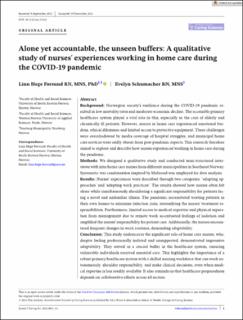| dc.contributor.author | Førsund, Linn Hege | |
| dc.contributor.author | Schumacher, Evelyn | |
| dc.date.accessioned | 2024-02-05T13:00:14Z | |
| dc.date.available | 2024-02-05T13:00:14Z | |
| dc.date.created | 2024-01-05T14:20:20Z | |
| dc.date.issued | 2023 | |
| dc.identifier.citation | Førsund, L. H., & Schumacher, E. Alone yet accountable, the unseen buffers: A qualitative study of nurses' experiences working in home care during the COVID-19 pandemic. Scandinavian Journal of Caring Sciences. | en_US |
| dc.identifier.issn | 0283-9318 | |
| dc.identifier.uri | https://hdl.handle.net/11250/3115641 | |
| dc.description.abstract | Background: Norwegian society's resilience during the COVID-19 pandemic resulted in low mortality rates and moderate economic decline. The accessible primary healthcare system played a vital role in this, especially in the care of elderly and chronically ill patients. However, nurses in home care experienced emotional burdens, ethical dilemmas and limited access to protective equipment. These challenges were overshadowed by media coverage of hospital struggles, and municipal home care services were oddly absent from post-pandemic reports. This research therefore aimed to explore and describe how nurses experienced working in home care during the pandemic.
Methods: We designed a qualitative study and conducted semi-structured interviews with nine home care nurses from different municipalities in Southeast Norway. Systematic text condensation inspired by Malterud was employed for data analysis.
Results: Nurses' experiences were described through two categories: ‘adapting approaches’ and ‘adapting work practices’. The results showed how nurses often felt alone while simultaneously shouldering a significant responsibility for patients facing a novel and unfamiliar illness. The pandemic necessitated treating patients in their own homes to minimise infection risks, intensifying the nurses' treatment responsibilities. Furthermore, limited access to medical expertise and physical separation from management due to remote work accentuated feelings of isolation and amplified the nurses' responsibility for patient care. Additionally, the nurses encountered frequent changes in work routines, demanding adaptability.
Conclusion: This study underscores the significant role of home care nurses, who, despite feeling professionally isolated and unsupported, demonstrated impressive adaptability. They served as a crucial buffer in the healthcare system, ensuring vulnerable individuals received essential care. This highlights the importance of a robust primary healthcare system with a skilled nursing workforce that can work autonomously, shoulder responsibility, and make clinical decisions, even when medical expertise is less readily available. It also reminds us that healthcare preparedness depends on collaborative efforts across all sectors. | en_US |
| dc.language.iso | eng | en_US |
| dc.rights | Navngivelse 4.0 Internasjonal | * |
| dc.rights.uri | http://creativecommons.org/licenses/by/4.0/deed.no | * |
| dc.title | Alone yet accountable, the unseen buffers: A qualitative study of nurses' experiences working in home care during the COVID-19 pandemic | en_US |
| dc.type | Peer reviewed | en_US |
| dc.type | Journal article | en_US |
| dc.description.version | publishedVersion | en_US |
| dc.rights.holder | © 2023 The Authors. | en_US |
| dc.source.pagenumber | 1-13 | en_US |
| dc.source.journal | Scandinavian Journal of Caring Sciences | en_US |
| dc.identifier.doi | https://doi.org/10.1111/scs.13231 | |
| dc.identifier.cristin | 2221498 | |
| cristin.ispublished | true | |
| cristin.fulltext | original | |
| cristin.qualitycode | 1 | |

